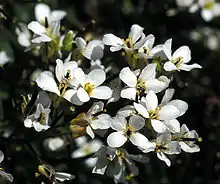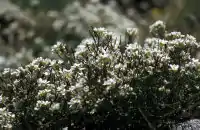| Draba lactea | |
|---|---|
 | |
| Scientific classification | |
| Kingdom: | Plantae |
| Clade: | Tracheophytes |
| Clade: | Angiosperms |
| Clade: | Eudicots |
| Clade: | Rosids |
| Order: | Brassicales |
| Family: | Brassicaceae |
| Genus: | Draba |
| Species: | D. lactea |
| Binomial name | |
| Draba lactea | |
Draba lactea, the Lapland whitlow-grass or milky whitlow-grass, is a flower common throughout the high Arctic. It stretches further south in mountainous areas of Norway, Montana, Canada, and Greenland.[1][2][3]
The plant is 2–5 cm tall, and caespitose. The flower stems are glabrous. The leaves have stellate hairs on the surface and simple hairs at the margins. The flowers are pure white, and there are many flowers on each stem. Flowers bloom June to August.[4]
Draba species are found on dry as well as moist localities such as wet meadows, fields and prairies.[5] Most of the species have a circumpolar distribution,[4] but there is considerable variation within this group.
References
Wikimedia Commons has media related to Draba lactea.
- ↑ Grønlands flora. Tyge Wittrock Böcher (3. reviderede udgave ed.). København: P. Haase & Sons. 1978. ISBN 87-559-0385-1. OCLC 183098604.
{{cite book}}: CS1 maint: others (link) - ↑ Nordens flora. Bo Mossberg, Lennart Stenberg, Jon Feilberg, Anna Torsteinsrud, Victoria Widmark (Nye, udvidede og omarbejdede udgave ed.). Kbh.: Gyldendal. 2020. ISBN 978-87-02-28916-9. OCLC 1158895781.
{{cite book}}: CS1 maint: others (link) - ↑ "Pan-arctic flora: Home". panarcticflora.org. Retrieved 2021-06-19.
- 1 2 "Draba lactea in Flora of North America @ efloras.org". www.efloras.org.
- ↑ "Lady Bird Johnson Wildflower Center - The University of Texas at Austin". www.wildflower.org. Retrieved 2022-02-20.

Draba lactea: habit
This article is issued from Wikipedia. The text is licensed under Creative Commons - Attribution - Sharealike. Additional terms may apply for the media files.